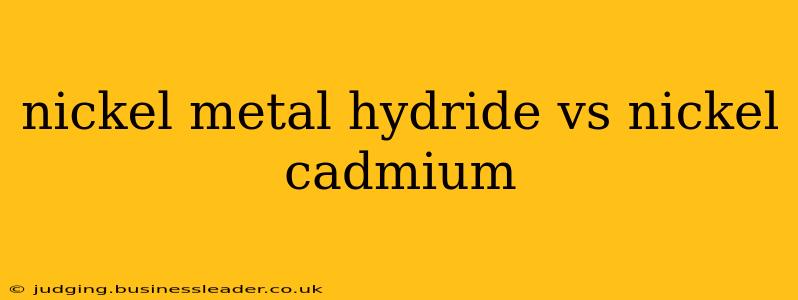Choosing the right rechargeable battery can be crucial, especially when considering the long-term performance and environmental impact. This detailed comparison explores the key differences between Nickel Metal Hydride (NiMH) and Nickel Cadmium (NiCd) batteries, helping you make an informed decision based on your specific needs.
What are NiMH and NiCd Batteries?
Both NiMH and NiCd batteries are rechargeable batteries using a similar electrochemical process. They're both known for their relatively long lifespan and ability to withstand repeated charge-discharge cycles. However, their internal chemistry and performance characteristics differ significantly.
NiCd (Nickel-Cadmium) batteries: These were once extremely popular, particularly in portable electronics and power tools. They boast a high energy density and can tolerate deep discharges. However, they have significant drawbacks, discussed in detail below.
NiMH (Nickel-Metal Hydride) batteries: These are the successors to NiCd, offering many improvements while addressing the environmental concerns associated with cadmium. NiMH batteries offer higher energy density than their NiCd predecessors, making them a preferred choice for many applications.
NiMH vs. NiCd: Key Differences
Here's a breakdown of the critical distinctions between NiMH and NiCd batteries:
1. Environmental Impact: What are the environmental concerns related to NiCd batteries?
This is a crucial difference. NiCd batteries contain cadmium, a highly toxic heavy metal. Improper disposal of NiCd batteries can lead to soil and water contamination, posing significant environmental risks. NiMH batteries, on the other hand, are considered environmentally friendlier as they don't contain cadmium. They are generally easier to recycle and have a smaller environmental footprint.
2. Energy Density: Which battery type offers a higher energy density?
NiMH batteries generally offer a higher energy density than NiCd batteries, meaning they can store more energy for their size. This translates to longer operating times for devices powered by these batteries. The advancements in NiMH technology have further increased their energy density, making them increasingly competitive.
3. Self-Discharge Rate: Do NiMH batteries self-discharge faster than NiCd batteries?
NiMH batteries have a higher self-discharge rate than NiCd batteries. This means they lose charge more quickly when not in use. This is a critical factor to consider if you need batteries that can sit unused for extended periods. However, low self-discharge (LSD) NiMH batteries have been developed to mitigate this issue.
4. Memory Effect: Which battery type is more susceptible to the memory effect?
The "memory effect" is a phenomenon where a battery "remembers" its previous discharge level, leading to reduced capacity if repeatedly recharged before fully discharging. NiCd batteries are significantly more susceptible to the memory effect than NiMH batteries. While NiMH batteries can exhibit a slight memory effect, it's much less pronounced.
5. Voltage: What is the voltage difference between NiMH and NiCd batteries?
Both NiCd and NiMH batteries provide a nominal voltage of 1.2V per cell. The voltage remains fairly consistent throughout the discharge cycle, although it does slightly decrease towards the end.
6. Cost: Which battery type is generally more expensive?
Generally, NiMH batteries are slightly more expensive than NiCd batteries. However, considering their longer lifespan and better environmental profile, the higher initial cost can be justified in the long run.
7. Charging Time: Do NiMH batteries take longer to charge than NiCd batteries?
NiMH batteries typically charge slightly faster than NiCd batteries. However, charging times can vary depending on the charger and battery capacity.
Conclusion
While NiCd batteries were once the dominant choice, NiMH batteries have largely superseded them due to their superior energy density, reduced memory effect, and environmentally friendly composition. The slightly higher initial cost and faster self-discharge rate of NiMH batteries are often outweighed by their overall benefits. The choice ultimately depends on your specific application and priorities. If environmental considerations are paramount, or you need longer run times, NiMH is the clear winner. If cost is the primary concern and the memory effect is acceptable, NiCd might still be a viable option, but with careful attention to proper disposal.
